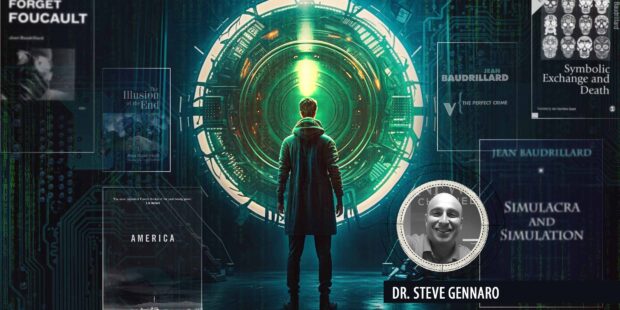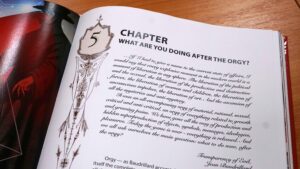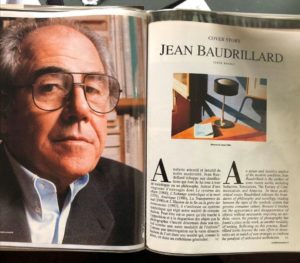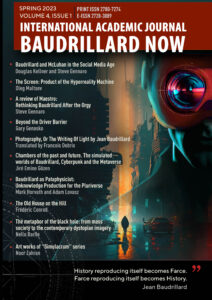
Rethinking Baudrillard After the Orgy and How to Get Out of a Simulation
A review of Maestro. Jean Baudrillard. The Last Prophet of Europe (Dr. Oleg Maltsev)
by Dr. Steve Gennaro
The years of 2022-3 continue to bring with it a series of unfortunate global events and accompanying uncertainty. The COVID-19 pandemic remains widespread and more recently the actions of Russia in Ukraine pose a significant danger to human life and to global security. And yet, as Dr. Oleg Maltsev brilliantly points out in his recent work Maestro. Jean Baudrillard. The Last Prophet of Europe, all these events were foreseen and were in fact quite predictable. What is perhaps more concerning, is what will come next: after the pandemic ends, after Russia exits Ukraine, after Elon Musk will finish introducing new reforms in Twitter, or sends more millionaires into space? What will fill the void after the orgy? If history is any indication, then what will follow is increased simulation, amplified hyperreality, intensified mysticism, and diminished choice (apart from the illusion of choice in a consumer society). However, in his examination of Philosopher Jean Baudrillard, Dr. Oleg Maltsev suggests an alternative: that in fact, Jean Baudrillard’s work offers us a fuller understanding of the game, of the structures that allow the game to operate and perpetuates the game’s existence, and for the ability of each individual to be a philosopher in action. The answer is simple: see past the illusion, choose to speak to truth, and “unrob the bank.”

Reading Maltsev’s Maestro. Jean Baudrillard. The Last Prophet of Europe reminded me of stories and movies where characters get sucked deeper and deeper into a simulation. In the Red Dwarf novels, there is a video game called “Better than Life”. The game is dangerously addictive. Once someone is inside the game, they do not realize that it is a game. Leaving the game is simple: clap their hands three times, whereupon the virtual reality system disengages. But if someone does not know they are in a game – whether they are having a great time, or living a nightmare – they will not try to get out, and will not remember how to get out. The analogy here is: globalization was built as a blueprint for a new reality, a New World Order which has turned into a nightmare.
In the process of building the new reality, the infrastructure which existed to head-off or respond to crises such as pandemics and wars has been dismantled. Health systems are overwhelmed even in normal times; militaries are dependent on state contractors and global production networks. Lockdowns, wars, and instability are disrupting global production chains: suddenly western Europe is short of grain and gas because of a war it cannot control, or consumer goods from China are suddenly unavailable worldwide. The Internet has turned into a field of information manipulation and information warfare, necessary for today’s businesses yet riddled with reputational dangers. Yet nobody knows how to get out of the simulation, and the world’s leaders, such as the WEF, are trying to dig us deeper and deeper into it.
Maestro. Jean Baudrillard. The Last Prophet of Europe is a thorough investigation of Jean Baudrillard’s complete written works and his photography as one complete system of thought by Dr. Oleg Maltsev. Maltsev’s approach is thorough and rational, balancing science and philosophy in the same fashion that Baudrillard himself examined social interactions, capitalism, and mysticism as both a sociologist and a philosopher. This connection between sociology and philosophy is important to Maltsev’s unique exploration of Baudrillard since, as explained to the reader, Baudrillard’s importance and legacy have been largely overlooked when he is examined only in one or the other discipline (or by limiting him to being just a postmodernist, or a globalization theorist, etc). In the book, Dr. Maltsev reassembles brick by brick the overarching structure and techniques put forth by Baudrillard to not only criticize the emergence of the virtual and hyperreal, but also how to deal with these, by making visible key ideas of Jean Baudrillard that have been hidden from the naked eye (and deliberately by Baudrillard as Maltsev argues). This book has caused me to re-think what I thought about Baudrillard and has offered me insight into a whole new frame for examining what has taken place before, what is taking place now, and how to deal with what is on the horizon. In short, despite the pushback from academia and popular discourse against Jean Baudrillard’s ideas, in Maestro. Jean Baudrillard. The Last Prophet of Europe Maltsev successfully shows us how to clap our hands and leave the game.


